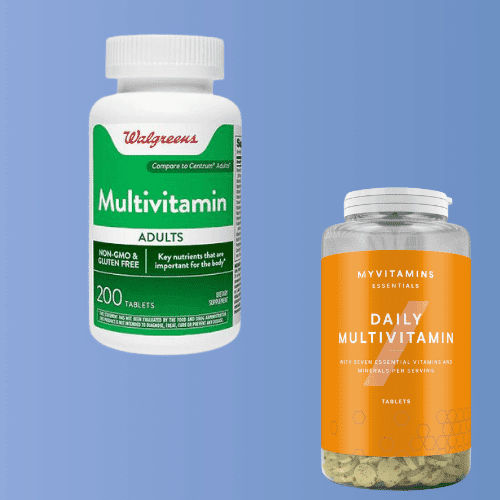Multivitamin supplements contain a combination of vitamins and minerals (and sometimes other ingredients) that are taken to provide vitamins that are not taken in through the diet and to supplement vitamin deficiencies. For today’s article, we’ll tackle when is the best time to take a multivitamin and how to make the most out of them.
Why Should You Take Multivitamins?

The body needs the necessary nutrients to last through the day’s grind. Naturally, you need to eat a healthy, balanced diet. However, not everyone gets to eat the right food every day, and sometimes their diet is still insufficient to fill in the necessary nutrient requirement, and that’s where multivitamin supplements come into the picture.
Multivitamins are a combination of different vitamins normally found in food sources and are used to provide ones that aren’t taken in through your diet. They help fill in some nutrient gaps so you can meet the recommended amount of vitamins and minerals.
Some of the benefits of taking multivitamins include:
- Increases energy levels -.Taking multivitamins and maintaining a healthy lifestyle can keep you energetic and fit. A study from the University of Melbourne and Swinburne University of Technology shows that the daily consumption of a multivitamin may significantly boost a person’s energy levels.
- Promotes muscle growth and strength – Multivitamins that contain vitamin A, the B-complex vitamins, and vitamin D play an important role in muscle growth and recovery. Studies show that they can reduce oxidative stress, prevent damage from free radicals, promote collagen production, and repair membranes on a cellular level. They also help build and increase muscle mass and help maintain structural strength.
- Boosts mood – Certain studies have shown that taking multivitamins can positively affect a person’s mood and emotional well-being. One trial even demonstrated that a four-week period of multivitamin supplementation could reduce mild symptoms of mood dysfunction.
- Reduces stress and anxiety – Your daily multivitamin’s vitamin and mineral content can also significantly reduce stress and anxiety levels. The B vitamins, in particular, work to convert food into energy, balance neurotransmitter levels, and even improve cognitive performance.
- Improves short-term memory – According to one study, multivitamins containing omega-3 fatty acids, huperzine A, and vitamin E showed great promise in slowing down or preventing memory loss. They also sharpen and improve one’s brain functions.
The Best Time To Take Multivitamins
If you’re taking a multivitamin or are considering taking one, you might be wondering when is the best time to take one or whether you should take it with food or on an empty stomach?
Technically speaking, there is no fixed time to take a multivitamin. But taking a multivitamin at a specific time helps the consumer be more consistent in taking the supplements. Taking them with or after a meal may reduce the chances of causing any stomach troubles or nausea.
Most multivitamin supplements are taken in the morning so you can ease absorption and allow the vitamins to be absorbed by the body to help it function throughout the day. Taking them much later can sometimes affect sleep, as evidenced by a study published in 2019.
Since multivitamins contain fat-soluble vitamins, it’s important to always take them with a meal rich in fats or oils. Fat-soluble vitamins such as vitamins A, D, E, and K, are classified as such because they dissolve in oil, which means they are slower to dissolve. So if you take them on an empty stomach, the capsules may not dissolve very well, which means that the body may not absorb them properly either.
However, there are periods of the day where a certain vitamin is best taken, for example:
- Vitamin A – Being a fat-soluble vitamin, you should take vitamin A supplements with a fat-containing meal to promote optimal absorption. However, studies are silent regarding whether it’s better to take vitamin A in the morning or the evening, so for now, you can take your vitamin A supplement whenever it’s most convenient for you.
- Vitamin B-complex – B-complex vitamins should be taken early in the day, preferably with a hearty breakfast, as they help the body produce energy from food. Taking them later in the day, according to a study, can interfere with your sleep at night, cause a higher risk of insomnia, and increase one’s intake of or dependence on sleep medicine.
- Vitamin C – Vitamin C is a largely important nutrient; it is a water-soluble nutrient, which means it’s best absorbed when you take it on an empty stomach. The ideal time would be to take your supplement first thing in the morning, at least 30-45 minutes before eating your breakfast.
- Vitamin D – One can take vitamin D at any time of the day, especially after eating high-fat foods such as fatty meat, cheese, milk, butter, avocado, eggs, nuts, or flax. A study found that vitamin D supplementation can increase sleep duration since it’s also involved in the production pathways of melatonin, the hormone involved in regulating human circadian rhythms and sleep.
- Vitamin E – The ideal time to consume Vitamin E supplements is with a meal at night, which will allow for the best absorption rate of the vitamin into your body. When paired with vitamin C, a study found that vitamin E can help improve nighttime breathing and sleep quality in people with obstructive sleep apnea.
- Vitamin K – Like vitamin D, you can take vitamin K supplements at any time of day with meals or snacks that are high in fat to fully maximize their absorption.
- Calcium – Calcium supplements should be taken with a meal at least two hours before and four to six hours before to avoid interacting with other medications, preventing absorption. Calcium supplements containing calcium citrate can be taken with or without food, while those containing calcium carbonate should always be taken with food.
- Iron – Iron is best when taken on an empty stomach, either with water or fruit juice (adults should drink a full glass/8 oz, while children should drink half a glass/4 oz), about an hour before or 2 hours after meals. However, iron may be taken with food or immediately after meals to prevent stomach troubles.
- Magnesium – Magnesium supplements can be taken at any time of the day, as long as you take them consistently. Some doctors, however, recommend taking magnesium at night before going to bed to reduce stress, induce relaxation, and help you sleep longer.
- Manganese – Manganese should be taken on an empty stomach to fully maximize its absorption into the body. If you’re taking an antacid or other laxatives, it’s recommended to take supplements containing manganese at least 1 hour before or 2 hours after taking them to prevent interaction. Iron supplements can also interact with manganese.
- Potassium – Potassium is best taken with a meal or bedtime snack or 30 minutes after meals. According to one study, a person’s potassium levels play a role in sleep, enabling better sleep quality, which makes it helpful to those who have trouble sleeping through the night.
- Selenium – Selenium supplements can be taken with or without food at any time, although thyroid expert Dr. Izabella Wentz says that it’s better to take them on an empty stomach to prevent food from interacting. A study also found that people who consume enough selenium at night have a significantly lower risk of having difficulty falling asleep.
- Zinc – Zinc supplements are most effective if taken at least an hour before or 2 hours after meals. However, if they cause stomach troubles, they can be taken with a meal. Also, if you’re taking copper, iron, or phosphorus supplements, make sure to space doses of each product 2 hours apart to get the full benefit from each dietary supplement.
Women taking prenatal vitamins should take them in the morning daily, as with traditional multivitamins. They should be taken on an empty stomach with water, but if you experience nausea while taking your prenatal vitamins during the day, take the supplements with a meal or before bedtime, ideally after dinner or a light snack.
Downsides Of Taking Multivitamins
While multivitamins help fill in nutritional gaps and supply important vitamins and minerals, that’s not to say they’re risk-free. Multivitamins, safe they may be, may not always yield the same result for all, and sometimes it can cause more trouble.
The more common side effects of taking multivitamins include:
- Constipation
- Diarrhea
- Nausea
- Stomach troubles
- Headaches
These effects are temporary and go away as your body adjusts to the medication. Some also experience sleeplessness, nosebleeding, and even liver damage in rarer instances.
Water-soluble vitamins like vitamin C can cause diarrhea if taken in excess, though for the most part, they are quickly excreted in urine and will rarely accumulate to toxic levels.
On the other hand, excessive doses of fat-soluble vitamins may lead to toxicity and health problems such as inflammatory bowel disease (IBD) and chronic pancreatitis.
Children are more likely to experience these side effects than adults. Some vitamin overdoses, like iron, can be dangerous and require immediate medical care, so consult a healthcare provider first before giving your child a multivitamin.
Takeaway
Multivitamins are extremely helpful for those who can’t reach their daily nutrient needs through diet alone and treat nutrient deficiencies caused by various conditions.
Regardless of what time of the day you should take the multivitamins, the most important thing is consistency â make them a part of your morning or bedtime routine. That way, you’ll maximize their full benefits.
However, it’s important to remember that multivitamins should never replace a balanced diet, and taking them in high amounts may result in side effects ranging from stomach troubles to liver damage. Always follow the recommended intake and consult your doctor if you’re experiencing problems with multivitamin supplementation.
Disclaimer: this article does not constitute or replace medical advice. If you have an emergency or a serious medical question, please contact a medical professional or call 911 immediately. To see our full medical disclaimer, visit our Terms of Use page.
Related Articles
Best Multivitamin for Men Over 50
Best Multivitamin For Women Over 40










